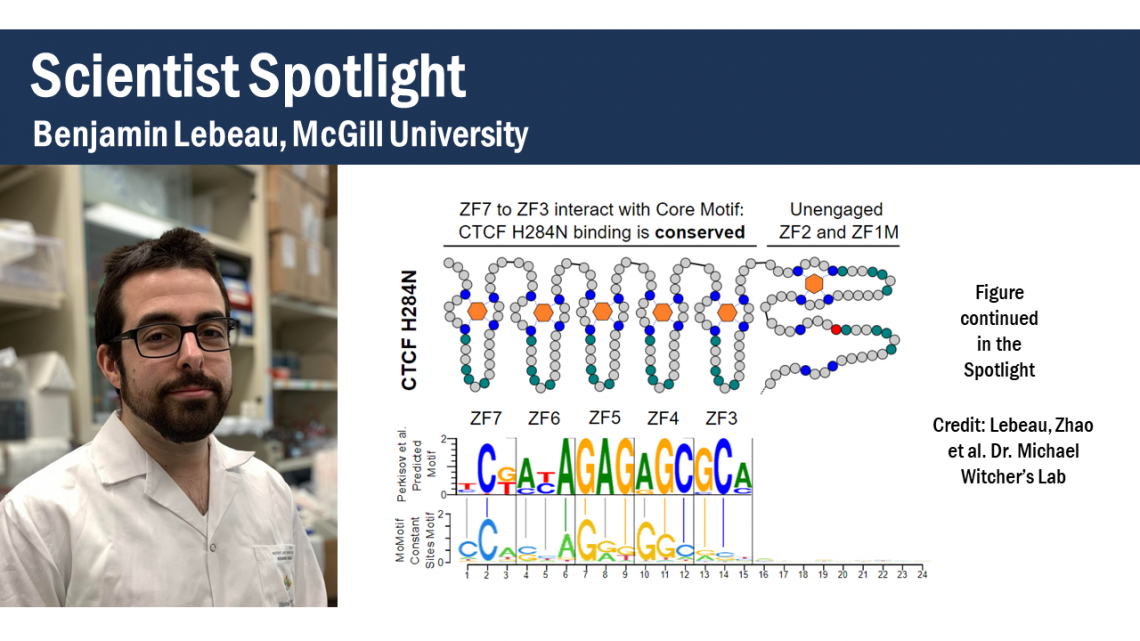Benjamin Lebeau obtained his BSc from the department of Anatomy and Cell Biology at McGill University. He now studies as a PhD student in Dr. Michael Witcher’s lab at the Lady Davis Institute of McGill University. His research focuses on the oncogenic and epigenetic impact of CTCF mutations or copy number loss in breast cancer. His projects currently investigate the changes in chromatin conformation driving breast cancer progression following CTCF loss of heterozygosity and a new bioinformatic tool to study the modification of DNA motif recognition following CTCF mutation. Next, he plans to move to Singapore to pursue postdoctoral studies that bridge artificial intelligence and epigenetics. Learn more about Benjamin.
Can you tell us more about your research?
Defining the impact of missense mutations on the recognition of DNA motifs is highly dependent on bioinformatic tools that define DNA binding elements. However, classical motif analysis tools remain limited in their capacity to identify subtle changes in complex binding motifs between distinct conditions. To overcome this limitation, we developed a new tool, MoMotif, that facilitates a sensitive identification, at the single base-pair resolution, of complex, or subtle, alterations to core binding motifs, discerned from ChIP-seq data. We employed MoMotif to define the previously uncharacterized recognition motif of CTCF zinc-finger 1 (ZF1), and to further define the impact of CTCF ZF1 mutation on its association with chromatin. Mutations of CTCF ZF1 are exclusive to breast cancer and are associated with metastasis and therapeutic resistance, but the underlying mechanisms are unclear. Using MoMotif, we identified an extension of the CTCF core binding motif, necessitating a functional ZF1 to bind appropriately. Using a combination of ChIP-Seq and RNA-Seq, we discover that the inability to bind this extended motif drives an altered transcriptional program associated with the oncogenic phenotypes observed clinically. Our study demonstrates that MoMotif is a powerful new tool for comparative ChIP-seq analysis and characterising DNA-protein contacts.

Credit: Lebeau, Zhao et al. Dr. Michael Witcher’s Lab
Where are you from? What do you miss about your hometown/country?
I’m originally from Joliette in the province of Québec. Since it is less than a 2 hours drive away from where I currently live, I can go back home often, so I don’t really miss anything.
What city do you currently live in and what do you like most about this city?
I currently live in Montréal. It is a very relaxing and lively city with a lot of green spaces, bars and restaurants. There is always something fun to do in Montréal!
What are some ways you detach from work/science/academia?
I like running long distances and working out. I like having a more physical disciple (in contrast to science) in which I can invest myself and seek constant progress. Also, it is both energizing and mentally relaxing, while efficiently using the calories accumulated in the aforementionned bars and restaurants.
Do you have any special talents outside of research that few people in your academic life know about?
I would not call it “talent” per se, but I enjoy learning about cooking techniques and the science behind flavors and textures. So I became a somewhat competent cook!
Do you have a recommendation for a book, tv show, movie or documentary?
I would say the long running manga series by Eiichiro Oda: One Piece. It already has more than a 1000 chapters, but the characters and the story are worth the countless hours it will take to go through it.
What made you decide to become a researcher?
I enjoy constantly learning new things, being intellectually challenged, and solving complex problems. So my interest in science and research came quite naturally.
If you wouldn’t be a researcher, what would you like to be/think you would be?
I would probably work in international finance and economics.
What sparked your interest in epigenetics?
Epigenetic regulation of gene expression is very dynamic and involve a deep and complex array of effectors. There is still so much to explain and to be discovered. In other (highly scientific) terms, I think it is very cool.
If you could give your “first-year-PhD-self” one advice, what would it be?
Since I started in 2018, I would say: “Go to as much in person conferences as you can, 2 years from now they will be quite rare!”
Where would you like to see your research/field of interest end up in the future?
I would like to see more interdisciplinary collaborations. Recent works showed how research in biophysics, cellular imaging/labelling or artificial intelligence/computational modeling, to name only a few, can be applied to study epigenetics. Incorporating these techniques together could enlight us on new approaches to therapeutically target theses regulatory processes with higher predictivity across models and organisms.

